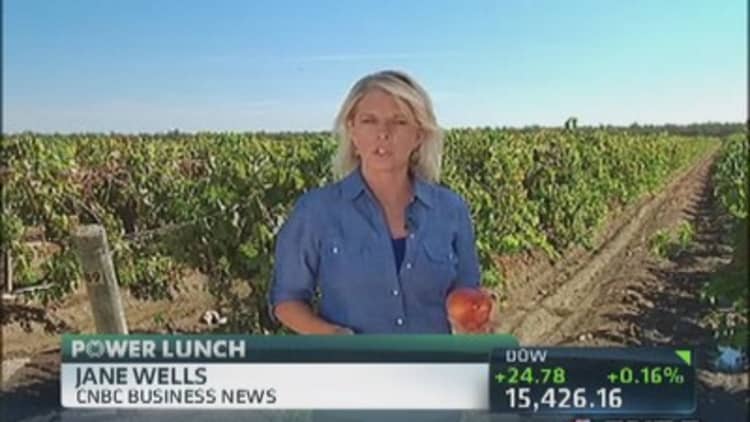The United Farm Workers union is fighting back against the efforts of one farmer who claims that the UFW and California's farm labor overseers have joined up to force a contract on him—even though he says his workers don't want union representation.
CNBC on Wednesday reported on Gerawan Farms, where workers voted last November on whether to decertify the United Farm Workers as their union. Months later, the votes remain impounded by the state's Agriculture Labor Relations Board (ALRB), the result unknown, as an investigator looks into whether the voting was legitimate.
"That will be up to an ALRB administrative law judge after listening to testimony by sworn witnesses from both sides in a hearing that could go on for months," UFW spokesman Marc Grossman said. The hearing is scheduled for next month.
Read More
Farmer Dan Gerawan told CNBC last year that the UFW returned to the farm in 2012 after a 20-year absence in order to demand a contract, and many of his workers balked at the idea of paying union dues. Most did not know the UFW had organized the workforce in the '90s. Gerawan said that the UFW was running low on membership and funding, and his large operation became a target.
Grossman countered that Gerawan is has been acting in bad faith. Even before the vote took place, the UFW said Gerawan engaged in "egregious multiple, serious and repeated violations of California law," including hampering the ability of workers to talk to the union, and he "unlawfully interrogated workers about their union activities."
According to the UFW, rather than abandoning the farm, it has worked at various times over the years to try to negotiate a contract.
Read MoreCalifornia drought: 'May have to migrate people'
"A 1994 UFW drive that involved thousands of Gerawan workers produced a complete bargaining proposal, but the company never submitted a counterproposal," the union said.
Dan Gerawan argued that the UFW proposal was "boilerplate" and "not very relevant" to his family's farm. "We asked them to submit a new more relevant proposal," but he said the union never responded and disappeared.
See the video below for CNBC's original report on Gerawan Farms and the UFW from last year.

It returned in 2004, according to Marc Grossman. "The UFW launched a new campaign to organize Gerawan workers and negotiate a contract in 2004 ... but the company also resisted meeting with the union then."
Gerawan again disagrees: "They did not ask to meet with us then. They did not contact us."
Asked why the UFW was not present for long periods of time and failed to press the issue with Gerawan Farming, Grossman said the union had no power to force the issue until the state passed mandatory mediation in 2002, a law that didn't get out of the appellate process until 2006.
"This is a giant company with 5,000 workers, maybe 70 crews spread over a large geographic area," Grossman told CNBC. "Under the UFW's democratic process, union negotiators can't just go talk with the company without the workers' involvement at every step of the way: organizing workers for bargaining crew by crew; workers electing their peers to a UFW worker negotiating committee. ... It's like turning around an aircraft carrier."
Read MoreRough road ahead for 'pension smoothing'
After negotiations began once more in 2012 and failed to produce a contract, a law that allows the state to impose a contract through mediation was invoked. This is the law Gerawan is fighting in court now.
While the ALRB mediator characterized the union's return after so many years to negotiate and impose membership fees as "a bit of an overreach," Grossman pointed out the mediator was also critical of Gerawan.
"The Employer's perspective on Union dues and fees is cast in dark tones, and ascribes to the Union some nefarious, self-serving purpose in collecting them," the mediator wrote. "Without any evidence, it claims that prior to the Union's re-emergence, employees were free to negotiate their own wages and benefit, as opposed to having them unilaterally imposed on them by their Employer."
The mediator said Gerawan also claimed that a contract with the UFW would be disadvantageous to workers. "The Employer presumes to speak on behalf of employees," the mediator said, "which in itself is a conflict of interest, claiming that the Union's bargaining efforts are 'unwanted.'"
For approximately 5,000 farm workers, those back wages and benefits would have conservatively translated into many millions of dollars.Marc GrossmanUFW spokesman
Grossman said that as the court battle continues, the three-year contract the state imposed on the farm is retroactive to last summer. If it prevails, the UFW said each Gerawan farm worker will receive close to $1,500 in back pay.
Three percent of wages would have to be paid as union dues, which the state mediator said is not unreasonable to cover "the cost of administering this Contract, given the size of the Employer's work force."
Read More
But all of that remains in a state of suspension as both sides await a court's decision on the validity of a state-imposed contract, and as they wait for a hearing on whether the vote to decertify was legitimate.
Gerawan has not been quiet, speaking out repeatedly against what he sees as an unconstitutional effort to thwart the desires of his own workers. The UFW, meanwhile, has ramped up its own efforts to tell its side of the story and demanding the new contract be enforced.
"For approximately 5,000 farm workers, those back wages and benefits would have conservatively translated into many millions of dollars," Grossman said.
—By CNBC's Jane Wells


